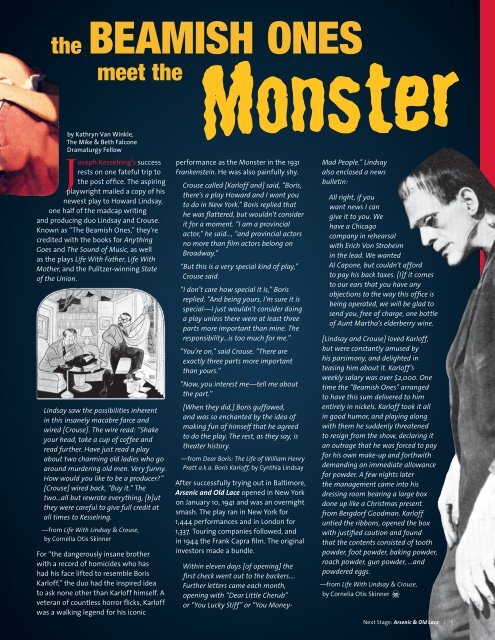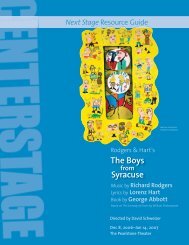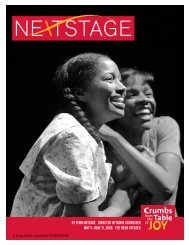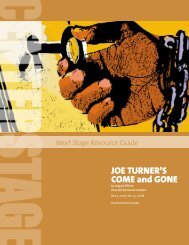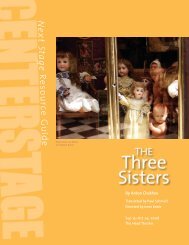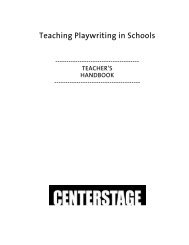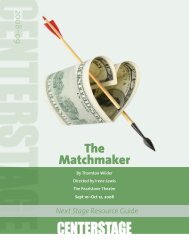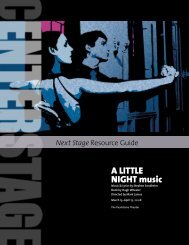Arsenic & Old lAce - Center Stage
Arsenic & Old lAce - Center Stage
Arsenic & Old lAce - Center Stage
You also want an ePaper? Increase the reach of your titles
YUMPU automatically turns print PDFs into web optimized ePapers that Google loves.
the Beamish Ones<br />
meet the<br />
by Kathryn Van Winkle,<br />
The Mike & Beth Falcone<br />
Dramaturgy Fellow<br />
Joseph Kesselring’s success<br />
rests on one fateful trip to<br />
the post office. The aspiring<br />
playwright mailed a copy of his<br />
newest play to Howard Lindsay,<br />
one half of the madcap writing<br />
and producing duo Lindsay and Crouse.<br />
Known as “The Beamish Ones,” they’re<br />
credited with the books for Anything<br />
Goes and The Sound of Music, as well<br />
as the plays Life With Father, Life With<br />
Mother, and the Pulitzer-winning State<br />
of the Union.<br />
Lindsay saw the possibilities inherent<br />
in this insanely macabre farce and<br />
wired [Crouse]. The wire read: “Shake<br />
your head, take a cup of coffee and<br />
read further. Have just read a play<br />
about two charming old ladies who go<br />
around murdering old men. Very funny.<br />
How would you like to be a producer?”<br />
[Crouse] wired back, “Buy it.” The<br />
two…all but rewrote everything, [b]ut<br />
they were careful to give full credit at<br />
all times to Kesselring.<br />
—from Life With Lindsay & Crouse,<br />
by Cornelia Otis Skinner<br />
For “the dangerously insane brother<br />
with a record of homicides who has<br />
had his face lifted to resemble Boris<br />
Karloff,” the duo had the inspired idea<br />
to ask none other than Karloff himself. A<br />
veteran of countless horror flicks, Karloff<br />
was a walking legend for his iconic<br />
performance as the Monster in the 1931<br />
Frankenstein. He was also painfully shy.<br />
Crouse called [Karloff and] said, “Boris,<br />
there’s a play Howard and I want you<br />
to do in New York.” Boris replied that<br />
he was flattered, but wouldn’t consider<br />
it for a moment. “I am a provincial<br />
actor,” he said…, “and provincial actors<br />
no more than film actors belong on<br />
Broadway.”<br />
“But this is a very special kind of play,”<br />
Crouse said.<br />
“I don’t care how special it is,” Boris<br />
replied. “And being yours, I’m sure it is<br />
special—I just wouldn’t consider doing<br />
a play unless there were at least three<br />
parts more important than mine. The<br />
responsibility…is too much for me.”<br />
“You’re on,” said Crouse. “There are<br />
exactly three parts more important<br />
than yours.”<br />
“Now, you interest me—tell me about<br />
the part.”<br />
[When they did,] Boris guffawed,<br />
and was so enchanted by the idea of<br />
making fun of himself that he agreed<br />
to do the play. The rest, as they say, is<br />
theater history.<br />
—from Dear Boris: The Life of William Henry<br />
Pratt a.k.a. Boris Karloff, by Cynthia Lindsay<br />
After successfully trying out in Baltimore,<br />
<strong>Arsenic</strong> and <strong>Old</strong> Lace opened in New York<br />
on January 10, 1941 and was an overnight<br />
smash. The play ran in New York for<br />
1,444 performances and in London for<br />
1,337. Touring companies followed, and<br />
in 1944 the Frank Capra film. The original<br />
investors made a bundle.<br />
Within eleven days [of opening] the<br />
first check went out to the backers….<br />
Further letters came each month,<br />
opening with “Dear Little Cherub”<br />
or “You Lucky Stiff” or “You Money-<br />
Mad People.” Lindsay<br />
also enclosed a news<br />
bulletin:<br />
All right, if you<br />
want news I can<br />
give it to you. We<br />
have a Chicago<br />
company in rehearsal<br />
with Erich Von Stroheim<br />
in the lead. We wanted<br />
Al Capone, but couldn’t afford<br />
to pay his back taxes. [I]f it comes<br />
to our ears that you have any<br />
objections to the way this office is<br />
being operated, we will be glad to<br />
send you, free of charge, one bottle<br />
of Aunt Martha’s elderberry wine.<br />
[Lindsay and Crouse] loved Karloff,<br />
but were constantly amused by<br />
his parsimony, and delighted in<br />
teasing him about it. Karloff’s<br />
weekly salary was over $2,000. One<br />
time the “Beamish Ones” arranged<br />
to have this sum delivered to him<br />
entirely in nickels. Karloff took it all<br />
in good humor, and playing along<br />
with them he suddenly threatened<br />
to resign from the show, declaring it<br />
an outrage that he was forced to pay<br />
for his own make-up and forthwith<br />
demanding an immediate allowance<br />
for powder. A few nights later<br />
the management came into his<br />
dressing room bearing a large box<br />
done up like a Christmas present<br />
from Bergdorf Goodman. Karloff<br />
untied the ribbons, opened the box<br />
with justified caution and found<br />
that the contents consisted of tooth<br />
powder, foot powder, baking powder,<br />
roach powder, gun powder, …and<br />
powdered eggs.<br />
—from Life With Lindsay & Crouse,<br />
by Cornelia Otis Skinner X<br />
Next <strong>Stage</strong>: <strong>Arsenic</strong> & <strong>Old</strong> Lace |


